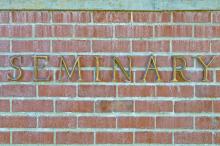Economic Justice

It’s no secret that the prison population in the United States has exploded in recent decades. We incarcerate our citizens at higher rates than any other developed nation. The federal prison population has increased by almost 790 percent since 1980. The number of children with one or more incarcerated parents has increased at an astonishing rate of 80 percent since 1991.
The mass incarceration of mostly Black and Latino men and women has moral implications in two ways. First, our current “tough-on-crime” approach to criminal justice has cost taxpayers a substantial amount with little effect on crime rates. These tax dollars could be spent instead on education, mental health, or drug rehabilitation. The way we spend public money reflects our public values. (Sound familiar?)
In addition, there are far-reaching moral implications of the act of naming someone “criminal." This label is inhumane, unjust, and unholy.
The “criminal” label has devastating effects on quality of life and equality of opportunity for many individuals. It is nearly impossible to shake. Most federal education grants are not available to someone with a criminal background. In many cities, access to subsidized or public housing is banned based on arrests or incarceration. Many states ban those with criminal backgrounds from food stamp eligibility. Being forced tocheck the box on an employment application indicating a past felony conviction essentially lands that application in the trash. The Sentencing Project estimates a total of 5.85 million people have been banned from voting because of a past conviction.
But Christians have a unique, biblically-based perspective on labels. In Christ, “sinners” become “beloved ones." The excluded, hated, and oppressed become included, wanted, and loved.









In a township called Khayelitsha, a woman wakes well before dawn to catch a bus that will carry her to the beautiful home in Cape Town where her employer/boss/master wants his tea in bed by 7 a.m. That is what “post-apartheid” South Africa still looks like today.
I just returned from a remarkable month in South Africa—the country that changed my life. I’ve often said that I learned my theology of hope from South Africa, during the anti-apartheid struggle I was thrust into as a young man. South African church leaders invited me in years ago. I got to see and experience the costly movement for freedom in the 1980s, witness the miracle of the inauguration of Nelson Mandela’s rainbow nation in 1994, and later join a wonderful reunion of South African activists, many of whom had been in exile or in prison, along with some of us international allies. So when I set out on a South African speaking and book tour 20 years after the new democracy, I didn’t know what to expect.
This time, I brought my family so they could see the country that had meant so much to me. What I discovered was a new generation of South African leaders ready to define their own vocation and mission as they help build a new nation. I quickly came to understand that making a deep connection with them was the real reason that I had come back. It’s tough to be in the shadow of a heroic generation of leaders like Desmond Tutu whose agenda has been the political liberation of South Africa—accomplished to the amazement of the world. On this trip, 20 years later, I saw the incredible freedom of movement now for all the former racial categories—but also how the systemic geography of apartheid was still painfully evident.
Economic inequality in South Africa is now greater than it was even during the days of apartheid, and gender violence is rampant. So these are the new agendas of a new generation: economic liberation and gender equality, with a commitment to lead on both in the churches. The rainbow of young people who turned up in such great numbers at all of our events truly want a new South Africa— a society yet to emerge.

Editor's Note: This is the final piece in a three-part series on Financing Seminary Education. Read Part 1 here and Part 2 here.
“The higher education industry is facing a multi-pronged and existential threat composed of successive waves of disruptive innovation” (Butler, “Tottering Ivory Towers,” American Interest (Sept/Oct). It seems higher education, including seminary education, is going the way of the music and media industries! Our 2,000-year-old business model of “sage on stage” could be truly doomed. The appearance of “massive open online courses” (MOOCs) over the past few years has thrown many higher education institutions for a loop, and more innovations are on the way.
In response to these new innovations higher-ed institutions, including seminaries, have tweaked their business models with a few technological modifications such as PowerPoint, email, electronic research, and online courses. But, will it be enough? Butler says “no” and so do the trends. The reality is graduates of today’s higher-ed institutions are not evidencing the competencies expected and/or hoped for by their future employers. Consequently, accreditation standards, at an all-time high in complexity, are now beginning to be challenged. Simultaneously, tuitions are costly, the economy is tough, and the job market is even tougher. The end result is that students are graduating with large amounts of student loan debt and potential students are opting out of the education market.
We began the 21st century with denominations and churches that no longer fit the needs of a shifting society, a Congress that votes against the poor and the middle class, and seminaries that face multi-pronged threats to their existence. It’s time for an overhaul!

Author’s Note: Institutions we have valued for generations are dwindling and falling by the wayside because we no longer have the finances to sustain them. In this second essay on financing seminary education (read the first HERE), I will address the socio-political and economic concerns that add to the complexity of the current crisis in theological education.
Democracy is based on the ideal of political equality. Each citizen is to have the same potential to influence what government does regardless of financial status. Markets, on the other hand, are directly related to real dollars. The consequent result for the U.S. democratic capitalistic structure is that while the rich and the poor are equal politically, they will never be equal economically. This combination could lead to two undesirable extremes: 1) mob rule by asset-less democratic majorities, or 2) oligarchic rule by the affluent. Thus, government’s role is to oversee the enterprise through the creation of regulatory policies that prevent runaway markets and taxation that assures a sustainable distribution of wealth and resources for the whole population. In order to achieve these goals, political theorists have developed models that focus on creating and sustaining a strong middle class with the result that the median voter will correct rising inequality in wealth as well as poor economic performance.


Memphis Teacher Residency believes that "urban education is the single greatest social justice and civil rights issue in America today."
THE 67 PEOPLE gathered in the basement of Union Baptist Church in Memphis have come from all over: Appalachian State University and Asbury College, Louisiana State and Liberty University, Wright State and Wheaton College. The youngest is 21; the oldest, 48. They’ve come to teach in some of the lowest performing schools in the state of Tennessee.
For the next 12 months, they’ll live, learn, and pray together, becoming a family as they also learn to become teachers and colleagues. All were drawn by faith and a dream that God is doing unexpected things in the city schools of Memphis.
Welcome to the Memphis Teacher Residency (MTR), a faith-based nonprofit that’s become one of the most effective teacher training programs in Tennessee.
At the front of the room, Rev. Tom Fuerst, an associate pastor at Christ United Methodist Church, gives the morning devotional. His message: The world is broken and so are Memphis schools. But God wants to fix them both. Fuerst describes the idea of “prior grace”—that God is at work in the world long before we are aware of it—and invites the new trainees to become agents of that grace by becoming great teachers.
But Fuerst, like everyone at MTR, is quick to warn the aspiring teachers—known as residents—against proselytizing. The residents, as public school teachers, don’t preach faith in the classroom, hold Bible studies, or actively discuss their faith. That would make the classroom unsafe for non-Christian students, warned Fuerst.

I eat, sleep, and breathe faith and politics; it is my passion and calling. From 9-5 each weekday, I direct communications and advocacy for Sojourners, moving around Washington, D.C. for various meetings, engaging with reporters and the media, and planning advocacy strategies around pressing justice issues. Then I turn off my computer and walk out the door. But instead of going home, I’m usually off to another meeting that has little to do with politics and everything to do with faith.
I’m a bi-vocational pastor, and I spend 15-20 additional hours working in a local congregation alongside several clergy colleagues, who themselves are a mix of full-time and part-time ministers. Serving in a church keeps me rooted. It provides perspective when the dysfunctions of Washington threaten to consume me. Helping people discover faith and integrate it into their lives renews and enlivens my soul.
Part of me pretends that I’d be spending this much time worshiping on Sunday morning and hanging out with my fellow young adults anyway, so I might as well be polishing my ministerial skills. But when I’m honest, I know it isn’t close to the same thing. I am way more invested in people’s lives – their joys and concerns – and the life of a particular community than I otherwise would be as “just a member of the congregation.” It is a demanding role that can be emotional, mentally and spiritually draining at times, but I love every minute of it. This is what I was made to do. Being a pastor is my identity. This calling is fundamental to who I am and how I understand myself in the world.
The number of bi-vocational ministers is increasing rapidly. Many pastors who work full-time jobs and serve in congregations part-time receive little or no pay for their church service. This trend has been described as “the future of the church” and extolled because the model is a return to “the original church” that will “enliven congregations.”

Paul said, "the foolishness of the cross" not "the stable middle-class lifestyle," if you want my opinion on seminary education, the changing economy, and baptismal identity in general. We bear a responsibility to care for one another as Christians (and beyond) that we have abdicated to the persnickety "marketplace." It's time to talk about holy poverty again, I think.
I can hear my free church friends and colleagues now, "But we don't take a vow of poverty!" It's true. We don't. We remember this historical movement away from the monasteries and the cathedrals, the parish system and the state church. This is an issue of ecclesiology, no question. What I wonder, however, is if in our attempts to not fall into the traps of the past, we simply have settled on the marketplace as our model for ecclesiology. I assume we have.
My degree is a "professional degree," yet within its conceptual framework the notion that I am "professed" is easily lost. I am not called to earn, but to labor, to serve. My work is "worth" nothing. Instead, it is a response to a vocation that in many ways we all share. The wealth of the community affords me the opportunity to respond to that shared call in a particular way. I am not your employee. I am your pastor. I am poor. Any wealth I may posses comes directly from the pockets of others.

The contemporary fast-paced, capitalistic, U.S. free market society has lost the traditional commitments to and comprehension of ‘church.’ Our parents and grandparents understood church as a community to which they belonged. Church was a place where many aspects of social life happened. The pastor was hired by the church people to care for and nurture the community, both individually and collectively. People looked to the pastor for spiritual inspiration, ethical guidance, sound counsel, and pastoral care. The pastor was an extended member of the family and people were happy to make a personal financial contribution to pay the pastor's salary and to keep the church building in repair. Somewhere along the line our society ‘outgrew’ this version of church.
A recent article in The Atlantic titled "Higher Calling, Lower Wages: The Vanishing of the Middle-Class Clergy" laments the shift away from the traditional model of financing church and clergy as well as the increased costs for training clergy. The average Master of Divinity student (the degree for pastoral training) graduates with tens of thousands of dollars in student loans — sometimes entering into the six-digit category. According to the U.S. department of labor, the median wage for a pastor is $43,800 — not a salary that lends itself to paying off high-end loans.

Water was created by none of us—just like air and earth and fire. It was not made to be enslaved in a market price or bottled into a "good," yielding ownership and power. Water is a commons, a precious gift given by the creator. But today, water is becoming the subject of war.